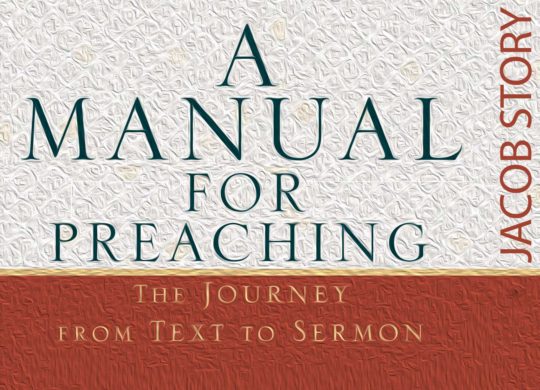Genesis 25:19–34

The beginning of the story sounds routine. The barrenness of the matriarch is not a first in Genesis. Neither is Yahweh’s answering of prayer to open wombs. However, the glaring difference between this initial scene of the Jacob Story and the Abraham Story must be pointed out: “but the sons …” (25:22). For the first time in biblically narrated human history, there is more than one individual in the same womb at the same time—two equals! The problem is this: Who will be the firstborn, and who will thereby obtain the sovereign blessing?
Obtaining divine blessing.
At the center of this pericope stands the children’s struggle and the divine oracle delineating the line of blessing.
Isaac is forty when he takes Rebekah as his wife (25:20)
Barrenness: Isaac “entreats” [‘atar] Yahweh because his wife is barren (25:21a)
Conception: Yahweh “answers” [‘atar] Isaac, and Rebekah conceives (25:21b)
Children struggle; Rebekah inquires of Yahweh; Yahweh sovereignly ordains (25:22–23)
Gestation: Her days of pregnancy are fulfilled; twins in the womb (25:24)
Delivery: Birth, appearance, and naming of children (25:25–26a)
Isaac is sixty when Rebekah gives birth (25:26b)
The fight to be firstborn is the drive to obtain the blessing of God, and the participants slug it out between themselves in a bid for the prize. The verb denoting “struggle” (ratsats, 25:22) is quite a violent term (used for “smashing/crushing” of skulls in Jdg 9:53); the hithpolel form of the Hebrew verb stem denotes the mutually aggressive action and reciprocity of the tussle. Both are culpable (both Jacob and Esau become negative examples for our identification—though one might conceivably focus upon Jacob’s grasping tendencies that get prominent billing here; Esau’s character flaw follows in the next episode of this pericope). Consider that this is part of a larger document written for the newly-birthed nation of Israel. Will there be intramural conflicts in that community as each member unilaterally seeks the blessing of God?
Conflicts in the zeal to appropriate divine blessing.
Two decades of prayer, two equals in the womb fighting—but man cannot direct blessing as he wishes. Divine design can never be overcome by human vigor. Only a sovereign God can ordain blessing, the centerpiece of this section of the pericope.
God sovereignly ordains blessing and conflicts ensue, in the zeal to appropriate divine blessing.
This episode, Genesis 25:19–26, thus projects the potential for human strife when God sovereignly blesses—in this case, strife between individuals who are equal—in the same womb at the same time.
God sovereignly ordains blessing, and conflicts ensue among equals in the community, in the zeal to obtain divine blessing.
The second episode, 25:27–34, is structured with a concluding emphasis on Esau’s despising of his birthright (he is clearly the negative example we must focus on).
A Jacob cooked stew (25:29a)
B Esau arrives hungry (25:29b)
C Esau asks Jacob for the “red stuff” (25:30)
D Jacob demands “birthright” “today” (25:31)
E “Birthright” disdained (25:32)
D’ Esau sells “birthright” “today” (25:33)
C’ Jacob gives Esau bread and stew (25:34a)
B’ Esau departs after eating and drinking (25:34b)
A’ Esau despised birthright (25:34c)
The account closes with Esau’s actions. The cascade of five qal imperfect Hebrew verbs (waw consecutives) is stunning … and condemning: “and he ate, and he drank, and he rose, and he went, and he despised” (25:34b)—the brutal staccato of Esau’s passions. This final comment from the narrator summarizing the story and providing a negative editorial assessment of what happened is quite rare in OT narrative. Ultimately Esau was despising Yahweh’s sovereign promises and blessings, a surrendering of valuable long-term blessing for the instant gratification of physical desires.
So, in the first episode, one (Jacob) wants the blessings of the other and each is willing to fight for it; in the second, one (Esau) despises his own blessing. (We identify negatively with both brothers. Or you could focus negatively on Jacob alone—the “heel grabber” [Gen 25:26].) Putting the ideas together, and moving from individuals to community, we may arrive at a Theological Focus …
God sovereignly ordains blessing, and conflicts ensue among equals in the community, in their zeal to obtain divine blessing, and particularly when they despise their own blessings from God—all leading to loss.
And here’s a shortened version:
Failing to recognize God’s sovereign distribution of blessing, and despising one’s own blessing, can lead to strife and loss.












 Abe Kuruvilla is the Carl E. Bates Professor of Christian Preaching at The Southern Baptist Theological Seminary (Louisville, KY), and a dermatologist in private practice. His passion is to explore, explain, and exemplify preaching.
Abe Kuruvilla is the Carl E. Bates Professor of Christian Preaching at The Southern Baptist Theological Seminary (Louisville, KY), and a dermatologist in private practice. His passion is to explore, explain, and exemplify preaching.